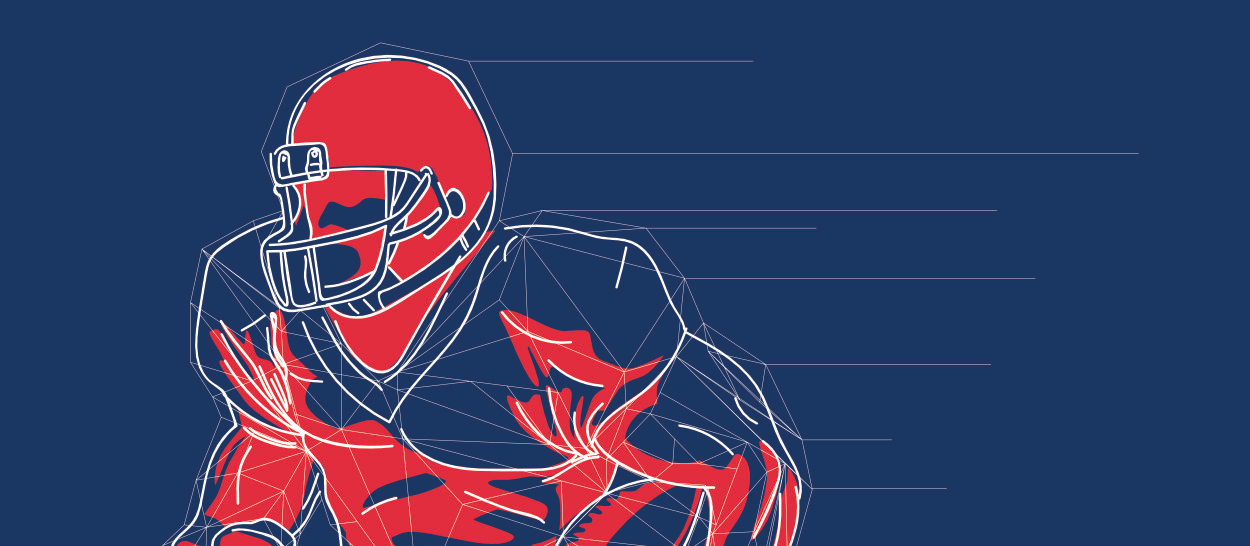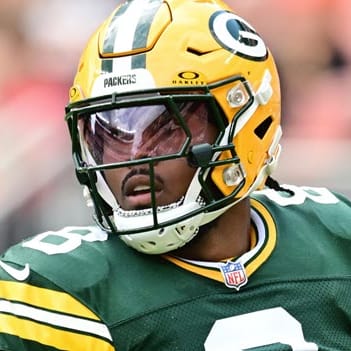This article is part of our Fantasy Football Draft Strategy series.
I'm a big fan of draft strategy in fantasy football. In a snake draft, once you chose a position to use your first-round draft pick on, you've chosen a path the rest of your draft. Take a QB and you'll be behind on gathering WR and RB. Take Rob Gronkowski at TE and you're behind on QB, WR and RB. Similarly, once you make a big purchase in an auction, you've limited what you can do at other positions.
Over the years I've tried to do a lot of math to figure out which path is best. And for the most part, it's paid off as I was well ahead of the trend of taking wide receivers early.
So what's the best draft strategy this year?
Are top WRs finally getting overrated?
My initial take is that the overall market may have overreacted to last year's terrible performance of top running backs. Seven running backs were taken in the top 15 of ADP last season and five ended up as busts. As a result, we're seeing fewer RB than ever in the first round of most drafts. Here's how the positions are being chosen on average in the first 15 picks from four promiment league manager/contest websites.
| League | WR | RB | QB | TE | Format |
| NFFC | 10 | 4 | 0 | 1 | 12-team PPR, starting 3 WR + Flex |
| MyFantasyLeage.com | 6 | 6 | 2 | 1 | 12-team non PPR |
| ESPN | 7 | 7 | 0 | 1 | 10-team |
| Yahoo | 8 | 6 | 0 | 1 | 12-team non PPR (but really |
I'm a big fan of draft strategy in fantasy football. In a snake draft, once you chose a position to use your first-round draft pick on, you've chosen a path the rest of your draft. Take a QB and you'll be behind on gathering WR and RB. Take Rob Gronkowski at TE and you're behind on QB, WR and RB. Similarly, once you make a big purchase in an auction, you've limited what you can do at other positions.
Over the years I've tried to do a lot of math to figure out which path is best. And for the most part, it's paid off as I was well ahead of the trend of taking wide receivers early.
So what's the best draft strategy this year?
Are top WRs finally getting overrated?
My initial take is that the overall market may have overreacted to last year's terrible performance of top running backs. Seven running backs were taken in the top 15 of ADP last season and five ended up as busts. As a result, we're seeing fewer RB than ever in the first round of most drafts. Here's how the positions are being chosen on average in the first 15 picks from four promiment league manager/contest websites.
| League | WR | RB | QB | TE | Format |
| NFFC | 10 | 4 | 0 | 1 | 12-team PPR, starting 3 WR + Flex |
| MyFantasyLeage.com | 6 | 6 | 2 | 1 | 12-team non PPR |
| ESPN | 7 | 7 | 0 | 1 | 10-team |
| Yahoo | 8 | 6 | 0 | 1 | 12-team non PPR (but really a grab bag/unknown) |
I picked a variety of sources (data as of July 26) to show the trend is pretty universal regardless of league format. In the NFFC (National Fantasy Football Championship) it's especially pronounced due to the fact it's PPR scoring and starts 3 WR + a RB/WR flex. Still, I'd imagine 10 WRs in the first 15 picks of ADP has to be a record. The ADP from Yahoo and ESPN is less defined since they amalgamate all kinds of league formats, but WRs still dominate.
My first response to a lot of these drafts is that the first round almost looks backward. Take a look at the first round of my recent RotoWire staff league drafted in Las Vegas (14 teams, non-PPR and starting 3 WR + Flex):
1. Todd Gurley
2. Antonio Brown
3. Rob Gronkowski
4. Julio Jones
5. Dez Bryant
6. Ezekiel Elliott
7. Odell Beckham
8. Le'Veon Bell
9. A.J. Green
10. David Johnson
11. Devonta Freeman
12. Adrian Peterson
13. Eddie Lacy
14. DeAndre Hopkins
If you flipped the entire first round upside down, or maybe at least reversed picks 3 through 14, it may look like a draft like last year. We can argue about individual players, but usually the top performing RB from last season are top-five picks. Freeman, Peterson, Johnson and Lacy (who some think could return to top form) are being passed over by WRs. That's unprecedented.
However, last year I detailed why taking a RB early puts you behind the eight ball most of the rest of the draft. I'm a big believer in taking WRs early. But bypassing a top-three RB late in the first round? It's putting my beliefs to the test.
Is Adrian Peterson getting overlooked?
Let's take Adrian Peterson as an example of the trend. Peterson finished last year with the most rushing yards and most rushing touchdowns in the league. His 4.5 YPC was a touch below his career average (4.9 YPC), but was still tied for 15th best in the league. He's never had less than 1,266 yards and ten touchdowns in any season where he played 14 or more games (which he's done in seven of nine seasons, with one year being an uncommon suspension).
Is there anything other than his age that shows any signs of decline? His offensive line should be better after the Vikings signed two free agents. His quarterback could improve and open some passing lanes. It's doubtful both situations will be worse.
Granted he turned 31, and running backs after 30 have terrible track records, but the market is pricing in a large discount for a potential decline. He's going 15th in the NFFC leagues. Sure, it's a PPR league and starts three WRs, but that's still low.
The other guy who seems to be getting overlooked is Devonta Freeman. Yes, he had a decline in the second half and has a viable backup in Tevin Coleman, but he led all running backs in fantasy points last season. When do you see a RB who led the league in fantasy points the year before fall out of the first round the next year without injury, a new team or suspension? It hasn't happened. Since 1998, the lowest the leading fantasy point scorer finished in the following year's ADP was DeMarco Murray last year. He finished first in fantasy points in 2014, but fell to 14th in ADP the next preseason. [More on Freeman's historic low price here].
Despite my initial take that top running backs were being undervalued, I decided to put the drafting wide receivers early plan to the test in my first draft of the year. RotoWire has an annual outing in Las Vegas in mid-July and we always have a fantasy football league draft. It was a 14-team league that starts 3 WRs, 1 Flex (TE/WR/RB), 2 RB, 1 TE, 1 QB and 1 K and 1 DEF. It's not a PPR league with standard scoring, except 3 points for QB TD passes.
I had the ninth pick and three great running back choices were on the board for me: Adrian Peterson, Devonta Freeman and David Johnson. Despite those options, I decided to stick to the WR-early strategy. I may have forced the strategy despite better options on the board, which is something I usually preach not to do. But I wanted to see how it would play out based on my theory those running backs are being undervalued.
There are also some specific reasons in this league to go the WR-early route. The three-point scoring for QB passing touchdowns devalues QBs. I'm usually the last to draft my first QB (I took Matt Ryan in the 12th round). With an early July draft date it's beneficial to load up on backup running backs before the injuries of the preseason happen. All six of my reserves are running backs. And by starting three WRs in a 14-team league plus a flex, the WRs get thin in the late rounds more than other formats.
Despite all those positives, I'm not sure I liked going the WR-WR route and forgoing those top running backs. I was able to get A.J. Green and Jordy Nelson, but I think that's a notch below the quality top two WRs you could get in the past with this strategy. Each of the last two years the ninth spot on average yielded a WR in the top three of ADP at the position. This year it's No. 5 on average.
I also wasn't as big a fan of the running backs available to me in the middle rounds. Maybe it's just the small sample size of one draft, but they seemed to be a grade below previous seasons. I grabbed Carlos Hyde, who I don't love but has some strong advanced metrics. The middle rounds featured lots of older backs (Matt Forte, Ryan Mathews, Rashad Jennings) and bounce-back candidates (Ameer Abdullah, Melvin Gordon) that I generally avoid because career arcs in football are so short. But that's not an objective opinion. I've done well in this league before by taking a motley crew of running backs and caring more about quantity than quality. If you have great receivers, you only need one or two to hit to have a strong team.
Those are my takeaways after my first two drafts. In my next column I'll crunch the numbers and see how the WR inflation impacts the WR-first strategy.










